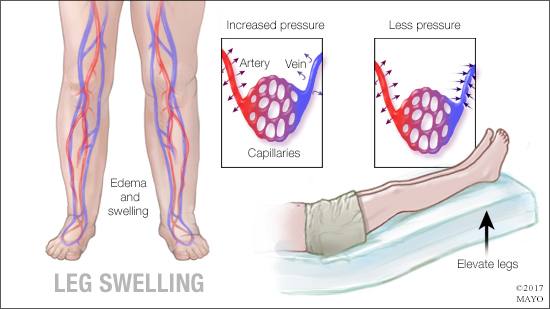-
Featured News
Mayo Clinic Q and A: Mild leg swelling should be evaluated
 DEAR MAYO CLINIC: I am 81 and in good health, but my legs sometimes become swollen. They don’t hurt, and it doesn’t feel like anything else is wrong. Why might this be happening? Is it something I should see my health care provider for?
DEAR MAYO CLINIC: I am 81 and in good health, but my legs sometimes become swollen. They don’t hurt, and it doesn’t feel like anything else is wrong. Why might this be happening? Is it something I should see my health care provider for?
ANSWER: Mild leg swelling in both legs without any other symptoms is relatively common in older adults and usually not serious. Still, it is recommended that you talk to your health care provider, as the cause or causes can be a sign of a more serious disorder.
Leg swelling caused by the retention of fluid in leg tissues is known as peripheral edema. Edema occurs when there’s a disruption in the way your body balances fluids. This causes fluids to leak out of tiny blood vessels and build up in surrounding tissues. In addition to swelling, you may notice stretched or shiny skin, or skin that stays indented after being pressed for at least five seconds.
There are a number of things that can cause this fluid buildup in both legs — including the feet, ankles, calves and thighs — without other symptoms. It can occur after having consumed more salt than usual the day before. Being overweight also can lead to swelling, as can standing or sitting for an extended period of time, or wearing tight stockings.
Leg swelling is also a side effect of certain medications, such as calcium channel blockers, corticosteroids and nonsteroidal anti-inflammatory drugs.
If your health care provider diagnoses mild edema without a worrisome cause, treatment may involve:
- Weight loss
- Exercise, possibly including swimming pool exercises, in which water pressure on the legs redistributes fluids
- Elevating the legs for an hour or two each day
- Minimizing salt intake
- Compression stockings to prevent fluid retention
- Adjusting a medication that may be contributing to edema
Sometimes, edema can have a more serious underlying cause. This is particularly true with swelling that occurs in only one leg or in conjunction with other signs and symptoms, such as shortness of breath, abdominal swelling or high blood pressure.
Potentially serious causes of edema may include blood clots in your leg, problems with your lymphatic system, liver or kidney disease, thyroid problems, sleep apnea, malnourishment, or heart failure. In these cases, treatment is directed toward the underlying cause, often in addition to the treatment steps mentioned above.
Make an appointment to see your health care provider to discuss your symptoms. He or she will be able to address your concerns and offer treatment options for your situation. (adapted from Mayo Clinic Health Letter) — Dr. Robert McBane, Vascular Medicine, Mayo Clinic, Rochester, Minnesota







